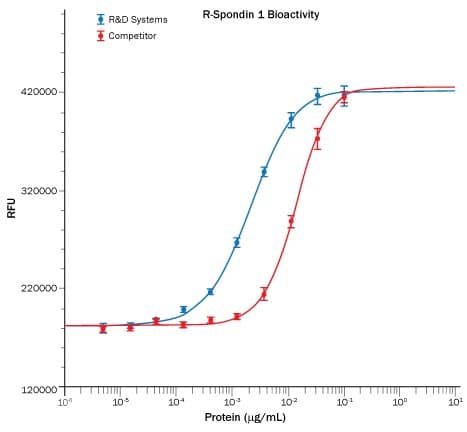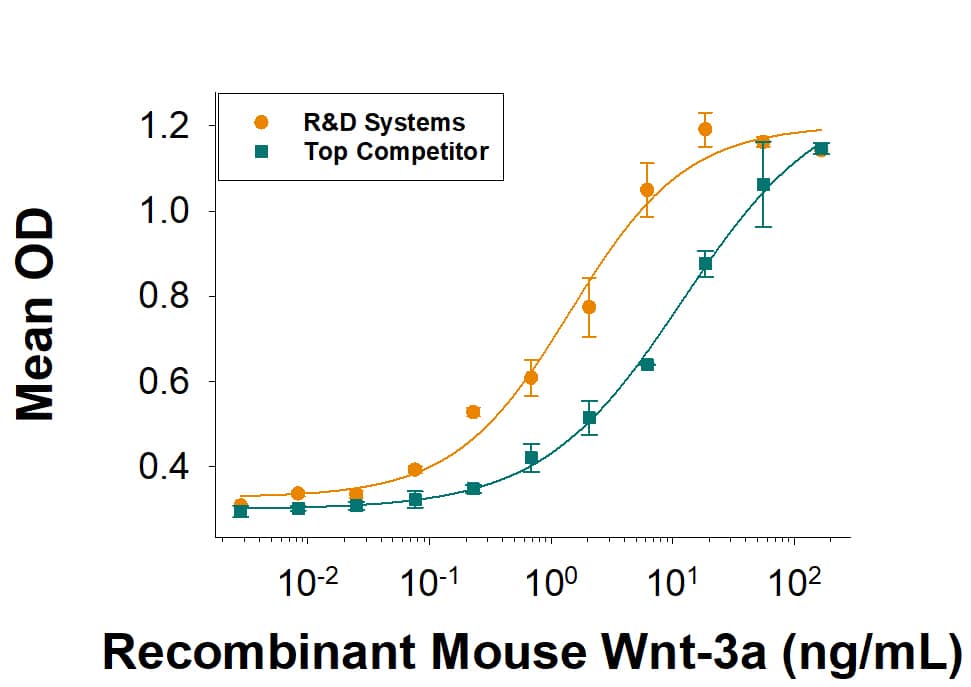Recombinant Mouse RNF43 Protein Fc Chimera, CF Summary
Product Specifications
| Mouse RNF43 (Ala34-Tyr197) Accession # Q5NCP0 | IEGRMDP | Mouse IgG2a (Glu98-Lys330) |
| N-terminus | C-terminus | |
Analysis
Customers also Viewed
Product Datasheets
Carrier Free
CF stands for Carrier Free (CF). We typically add Bovine Serum Albumin (BSA) as a carrier protein to our recombinant proteins. Adding a carrier protein enhances protein stability, increases shelf-life, and allows the recombinant protein to be stored at a more dilute concentration. The carrier free version does not contain BSA.
In general, we advise purchasing the recombinant protein with BSA for use in cell or tissue culture, or as an ELISA standard. In contrast, the carrier free protein is recommended for applications, in which the presence of BSA could interfere.
8890-RN
| Formulation | Lyophilized from a 0.2 μm filtered solution in PBS. |
| Reconstitution | Reconstitute at 100 μg/mL in PBS. |
| Shipping | The product is shipped at ambient temperature. Upon receipt, store it immediately at the temperature recommended below. |
| Stability & Storage: | Use a manual defrost freezer and avoid repeated freeze-thaw cycles.
|
Background: RNF43
RING finger protein 43 (RNF43) is a 90 kDa member of the ZNRF3 family of ubiquitin ligase proteins (1, 2). Mouse RNF43 is synthesized as a 784 amino acid (aa) protein that contains a putative 23 aa signal sequence, a 174 aa extracellular domain (ECD), a transmembrane domain, and a cytoplasmic domain with an atypical RING-type zinc finger (1). RNF43 is expressed in stem cells at the bottom of colon crypts, where it limits the ability of Wnts to induce proliferation (3). RNF43 and ZNRF3, another transmembrane E3 ubiquitin ligase, ubiquitinate and promote the turnover of Frizzled Wnt receptors to antagonize Wnt signaling (3, 4). RNF43 has been shown to suppress both canonical and non-canonical Wnt signaling pathways by distinct mechanisms (5). RNF43/ZNRF3-mediated turnover of Frizzled receptors is inhibited by R-Spondin (4). Dishevelled, a positive regulator of Wnt signaling, interacts with RNF43/ZNRF3 to mediate turnover of Frizzled receptors (6). RNF43 may promote cell survival by binding to NEDL1 and by suppressing the transcriptional activity of p53 (7, 8). RNF43 has been shown both to inhibit and promote cancer. Deletion of RNF43, as well as mutations found in colorectal and other cancers, allows hypersensitivity to Wnts and promotes adenoma formation (3, 9). Furthermore, RNF43 down-regulation in gliomas is associated with poor prognosis (10). However, RNF43 is frequently over-expressed in cancers, correlating with growth-promoting activity and colorectal and hepatocellular cancer pathogenesis (1, 7, 11).
- Yagyu, R. et al. (2004) Int. J. Oncol. 25:1343.
- de Lau, W. et al. (2014) Genes Dev. 28:305.
- Koo, B.K. et al. (2012) Nature 488:665.
- Hao, H.X. et al. (2012) Nature 485:195.
- Tsukiyama, T. et al. (2015) Mol. Cell. Biol. 35:2007.
- Jiang, X. et al. (2015) Mol. Cell 58:522.
- Xing, C. et al. (2013) Mol. Cancer Ther. 12:94.
- Shinada, K. et al. (2011) Biochem. Biophys. Res. Commun. 404:143.
- Giannakis, M. et al. (2014) Nat. Genet. 46:1264.
- Xi, S. et al. (2015) Int. J. Clin. Exp. Pathol. 8:490.
- Uchida, N. et al. (2004) Clin. Cancer Res. 10:8577.
FAQs
No product specific FAQs exist for this product, however you may
View all Proteins and Enzyme FAQsReviews for Recombinant Mouse RNF43 Protein Fc Chimera, CF
There are currently no reviews for this product. Be the first to review Recombinant Mouse RNF43 Protein Fc Chimera, CF and earn rewards!
Have you used Recombinant Mouse RNF43 Protein Fc Chimera, CF?
Submit a review and receive an Amazon gift card.
$25/€18/£15/$25CAN/¥75 Yuan/¥2500 Yen for a review with an image
$10/€7/£6/$10 CAD/¥70 Yuan/¥1110 Yen for a review without an image















